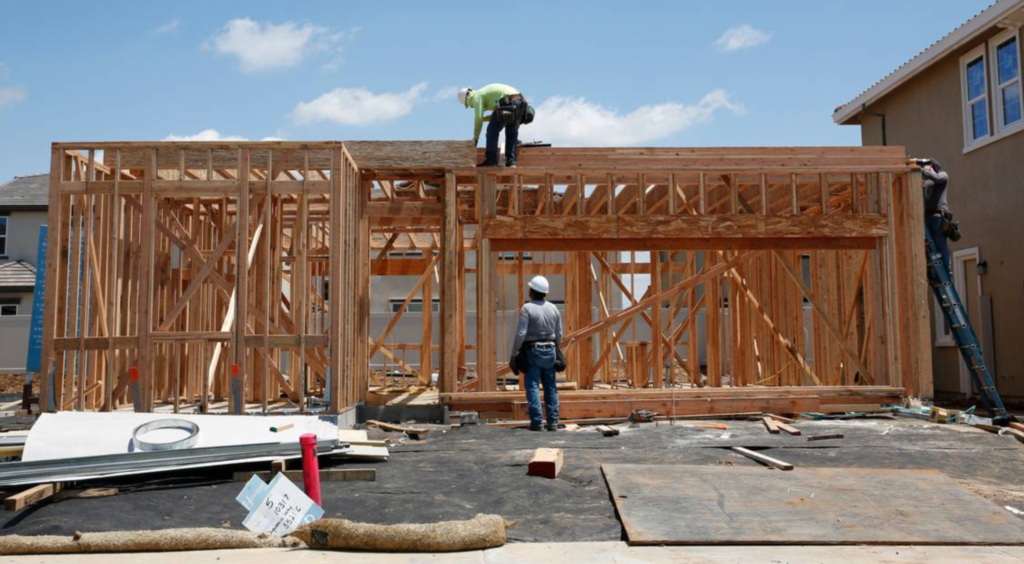
It’s hard to understand why California’s mighty trade unions would object to a policy that could help pull construction workers out of poverty and train the next generation of laborers. Yet the reliably obstructionist State Building and Construction Trades Council, and the legislators too afraid to cross them, are mobilizing against a bill that could be a breakthrough for California’s devastating housing crisis.
The influential umbrella group representing 450,000 construction workers is fighting a proposal that would accelerate affordable and mixed-income housing construction provided projects meet certain cost, labor and environmental criteria while also strengthening the workforce.
Assembly Bill 2011, authored by Assembly Housing Committee Chair Buffy Wicks, would fast-track approval of housing construction on underused urban and suburban commercial sites. It would also strengthen labor standards to guarantee project workers union-level wages and health benefits. And it includes apprenticeship provisions to boost a residential building sector in desperate need of more workers.
Unfortunately, the Trades, as the unions are known, like things the way they are. With a stranglehold on the Legislature and an outsize role in the construction sector, they see no reason to allow nonunion contractors and other labor groups to do better. If legislators give in to them again, they will be doing their part to perpetuate the housing crisis, homelessness and labor shortages.
Almost half of construction workers in California rely on food stamps or Medi-Cal, costing taxpayers over $3 billion annually, according to a 2021 study by the UC Berkeley Labor Center. The primary cause is “rampant” illegal employment practices, the study found, mostly misclassifying workers or paying them under the table. Wage theft has increased 400% over the last 50 years, and less than half of these workers have health care coverage. With cost of living factored in, California’s median construction pay ranks 46th in the U.S.
The result is a residential building sector in free fall. Since 2011, vacancies among supervisors and the four trades essential to housing construction — carpenters, laborers, electricians and plumbers — have surged 75%, according to a 2019 report on the state’s housing workforce. Meanwhile, the labor pool is aging rapidly, and apprenticeship programs remain an afterthought because they’re mostly voluntary in non-unionized construction work.
Wicks’ bill takes care to address these problems much as the trade unions have often demanded. It requires union-level wages on every project, mandates apprenticeships and establishes new enforcement tools to make sure new payroll and benefit standards are followed. With strict affordability requirements, the Oakland Democrat’s bill could debunk the idea that increasing wages and maintaining low housing prices is not feasible.
California Conference of Carpenters director Daniel Curtin, whose 82,000-member organization is a cosponsor of the bill, said that under the current enforcement system, an inspector is likely to visit a project site about once every 300 years. He considers the proposed reforms “the best labor standards in the country.” By tightening construction regulations and increasing wages and health care access, it would make the sector more competitive, Curtin said.
Residential construction workers have much to gain from AB 2011’s passage, making it clear that the Trades view opportunities for others as a threat. The unions claim “the so-called ‘worker protection language’ in this bill was written by those already counting the riches earned on the backs of construction workers. There is a proverbial ‘man behind the curtain’ pushing this bill and fronting the organizations chosen to advocate for it.”
Please.
The need for this kind of housing legislation is self-evident at this point. The state has to build 2.5 million units of housing by the end of the decade, or a minimum of 180,000 units per year, to meet the existing demand, according to the California Department of Housing and Community Development. The latest federal figures estimate that more than 161,000 people are experiencing homelessness in California, almost twice as many as in the next worst state. Roughly 4.1 million households are spending at least 30% of their monthly income on housing.
Construction workers feel the crush of those forces, too, which makes the Trades’ opposition to improving the pay and benefits for laborers that much more mystifying.
Wicks’ bill would streamline housing development, diminish opportunities for NIMBYism, develop underused property and disrupt exploitation of workers. It deserves broad support.

